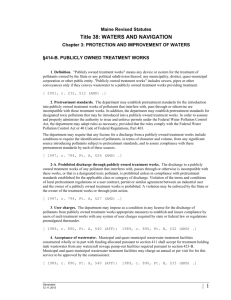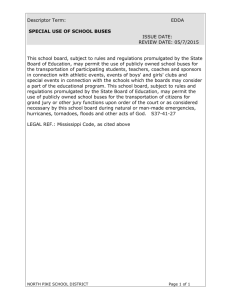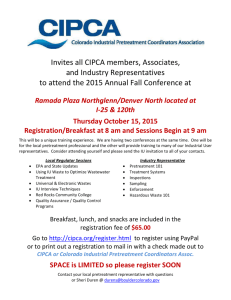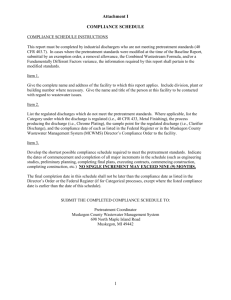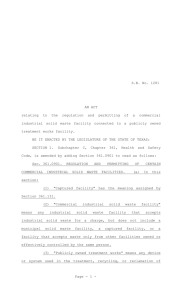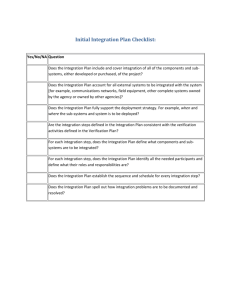PUBLICLY OWNED TREATMENT WORKS PENALTY LAW
advertisement
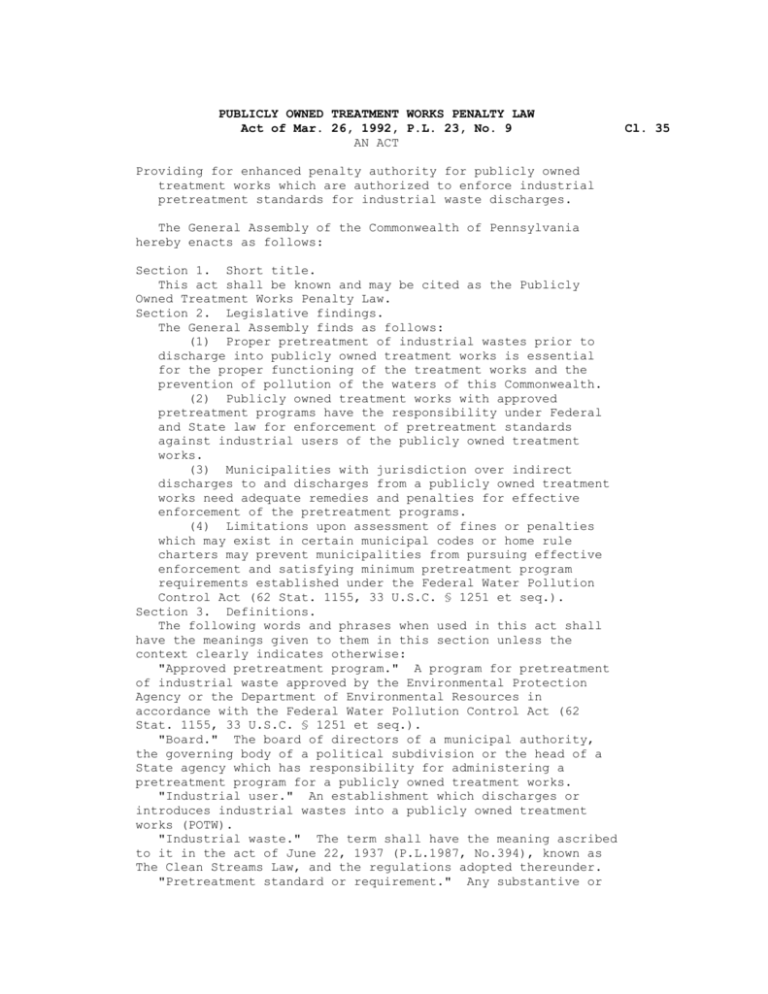
PUBLICLY OWNED TREATMENT WORKS PENALTY LAW Act of Mar. 26, 1992, P.L. 23, No. 9 AN ACT Providing for enhanced penalty authority for publicly owned treatment works which are authorized to enforce industrial pretreatment standards for industrial waste discharges. The General Assembly of the Commonwealth of Pennsylvania hereby enacts as follows: Section 1. Short title. This act shall be known and may be cited as the Publicly Owned Treatment Works Penalty Law. Section 2. Legislative findings. The General Assembly finds as follows: (1) Proper pretreatment of industrial wastes prior to discharge into publicly owned treatment works is essential for the proper functioning of the treatment works and the prevention of pollution of the waters of this Commonwealth. (2) Publicly owned treatment works with approved pretreatment programs have the responsibility under Federal and State law for enforcement of pretreatment standards against industrial users of the publicly owned treatment works. (3) Municipalities with jurisdiction over indirect discharges to and discharges from a publicly owned treatment works need adequate remedies and penalties for effective enforcement of the pretreatment programs. (4) Limitations upon assessment of fines or penalties which may exist in certain municipal codes or home rule charters may prevent municipalities from pursuing effective enforcement and satisfying minimum pretreatment program requirements established under the Federal Water Pollution Control Act (62 Stat. 1155, 33 U.S.C. § 1251 et seq.). Section 3. Definitions. The following words and phrases when used in this act shall have the meanings given to them in this section unless the context clearly indicates otherwise: "Approved pretreatment program." A program for pretreatment of industrial waste approved by the Environmental Protection Agency or the Department of Environmental Resources in accordance with the Federal Water Pollution Control Act (62 Stat. 1155, 33 U.S.C. § 1251 et seq.). "Board." The board of directors of a municipal authority, the governing body of a political subdivision or the head of a State agency which has responsibility for administering a pretreatment program for a publicly owned treatment works. "Industrial user." An establishment which discharges or introduces industrial wastes into a publicly owned treatment works (POTW). "Industrial waste." The term shall have the meaning ascribed to it in the act of June 22, 1937 (P.L.1987, No.394), known as The Clean Streams Law, and the regulations adopted thereunder. "Pretreatment standard or requirement." Any substantive or Cl. 35 procedural provision of the Federal Water Pollution Control Act (62 Stat. 1155, 33 U.S.C. § 1251 et seq.) or the act of June 22, 1937 (P.L.1987, No.394), known as The Clean Streams Law, or any rule or regulation, ordinance or term or condition of a permit or order adopted or issued by the Commonwealth or a POTW for the implementation or enforcement of an industrial waste pretreatment program established under the Federal Water Pollution Control Act or The Clean Streams Law. "Publicly owned treatment works (POTW)." A publicly owned treatment works as defined by section 212 of the Federal Water Pollution Control Act (62 Stat. 1155, 33 U.S.C. § 1251 et seq.) which is owned by a state or municipality, as defined by section 502(4) of the Federal Water Pollution Control Act. The term includes devices and systems used in the storage, treatment, recycling and reclamation of municipal sewage or industrial wastes of a liquid nature. It also includes sewers, pipes and other conveyances only if they convey wastewater to a POTW plant. The term also means: (1) A municipality, as defined in section 502(4) of the Federal Water Pollution Control Act, which has jurisdiction over indirect discharges to and discharges from this type of treatment works. (2) An authority created under the act of May 2, 1945 (P.L.382, No.164), known as the Municipality Authorities Act of 1945, which has jurisdiction over indirect discharges to and discharges from this type of treatment works. Compiler's Note: The Department of Environmental Resources, referred to in the def. of "approved pretreatment program," was abolished by Act 18 of 1995. Its functions were transferred to the Department of Conservation and Natural Resources and the Department of Environmental Protection. Section 4. Penalty. (a) Assessment.-(1) In addition to proceeding under any other remedy available at law or equity for violation of pretreatment standards and/or requirements, a publicly owned treatment works with an approved pretreatment program may assess a civil penalty upon an industrial user for the violation. The penalty may be assessed whether or not the violation was willful or negligent. The civil penalty shall not exceed $25,000 per day for each violation, regardless of jurisdictional boundaries. Each violation for each separate day shall constitute a separate and distinct offense under this section. (2) The publicly owned treatment works shall include as part of the notice of an assessment of civil penalties a description of the applicable appeals process to be followed, including the name, address and telephone number of the person responsible for accepting such appeal. (b) Operational upsets.--For purposes of this section, a single operational upset which leads to simultaneous violations of more than one pretreatment standard or requirement shall be treated as a single violation as required by the Federal Water Pollution Control Act (62 Stat. 1155, 33 U.S.C. § 1251 et seq.). The publicly owned treatment works may, however, recover its costs for reestablishing the operation of the POTW, in addition to any civil penalty imposed under this section. (c) Policy.--The board of the publicly owned treatment works shall publicly adopt a formal, written civil penalty assessment policy and make it publicly available. Each industrial discharger participating in the pretreatment program shall be given written notice of the policy. In developing the penalty assessment policy, the publicly owned treatment works shall consider damage to air, water, land or other natural resources of this Commonwealth and their uses; cost of restoration and abatement; savings resulting to the person in consequence of the violation; history of past violations; deterrence of future violations; and other relevant factors. (d) Uses for penalties.--Civil penalties collected pursuant to this act shall be placed in a restricted account and shall only be used by the publicly owned treatment works for the repair of damage and any additional maintenance needed or any additional costs imposed as a result of the violation for which the penalty was imposed, to pay any penalties imposed on the publicly owned treatment works by the Federal or State Government for violation of pretreatment standards, for the costs incurred by the publicly owned treatment works to investigate and take the enforcement action that resulted in a penalty being imposed, for the monitoring of discharges in the pretreatment program and for capital improvements to the treatment works, including sewage collection lines, which may be required by the pretreatment program. Any remaining funds may be used for capital improvements to the treatment works, including collection lines. Section 5. Injunctive relief. (a) General rule.-(1) The POTW shall have the power to obtain injunctive relief to enforce compliance with or restrain any violations of any pretreatment standard. Injunctive relief shall be granted upon the showing of one or more of the following: (i) a discharge from an industrial user presents an imminent danger or substantial harm to the POTW or the public; (ii) a discharge from an industrial user presents an imminent or substantial endangerment to the environment; (iii) a discharge from an industrial user causes the POTW to violate any condition of its discharge permit; or (iv) the industrial user has shown a lack of ability or intention to comply with a pretreatment standard. (2) Notwithstanding paragraph (1), an injunction affecting an industrial operation not directly related to the condition or violation in question may be issued if the court determines that other enforcement procedures would not be adequate to affect prompt correction of the condition or violation. In addition to an injunction, the court and any such proceedings may levy civil penalties in accordance with section 4. (b) Jurisdiction.--A POTW's power to seek injunctive relief shall apply to all industrial users regardless of jurisdictional boundaries. Injunctive proceedings may be prosecuted in the court of common pleas where the POTW is located, the activity has taken place, the condition exists or the public is affected, and to that end jurisdiction is hereby conferred in law and equity upon such courts. Section 6. Construction with other laws. (a) Other laws superseded.--The authority contained in this act shall apply to every publicly owned treatment works authorized by law to enforce an approved pretreatment program and shall supersede any limitation in a municipal law or a home rule charter as to the maximum amount of penalty that would otherwise apply under existing law. (b) Uniform penalty.--This act shall not be construed to modify jurisdiction or procedures for the assessment or collection of fines and penalties by municipalities or publicly owned treatment works. It shall have the sole effect of making the penalty provided for in this act uniformly available to publicly owned treatment works. Section 7. Penalty cumulative and concurrent. (a) Other remedies preserved.--The penalty authorized in this act is intended to be concurrent and cumulative, and the provisions of this act shall not abridge or alter any right of action or remedy, now or hereafter existing in equity, or under the common law or statutory law, criminal or civil, available to a person, municipality or this Commonwealth. (b) Appeal.--The industrial user charged with the penalty shall have 30 days to pay the proposed penalty in full, or, if the industrial user wishes to contest either the amount of the penalty or the fact of the violation, the industrial user must file an appeal of the action pursuant to the municipal law or home rule charter or, in the absence of either of these, within 30 days pursuant to 2 Pa.C.S. (relating to administrative law and procedure). Failure to appeal within this period shall result in a waiver of all legal rights to contest the violation or the amount of the penalty. Section 8. Repeal. All acts and parts of acts are repealed insofar as they are inconsistent with this act. Section 9. Effective date. This act shall take effect in 30 days.
